外研版小学四年级英语下学期知识点总结
- 格式:docx
- 大小:25.74 KB
- 文档页数:10
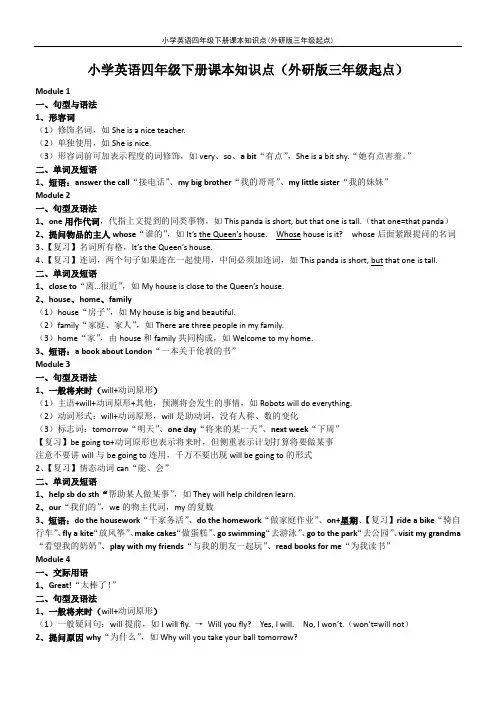
小学英语四年级下册课本知识点(外研版三年级起点)Module 1一、句型与语法1、形容词(1)修饰名词,如She is a nice teacher.(2)单独使用,如She is nice.(3)形容词前可加表示程度的词修饰,如very、so、a bit“有点”,She is a bit shy.“她有点害羞。
”二、单词及短语1、短语:answer the call“接电话”、my big brother“我的哥哥”、my little sister“我的妹妹”Module 2一、句型及语法1、one用作代词,代指上文提到的同类事物,如This panda is short, but that one is tall.(that one=that panda)2、提问物品的主人whose“谁的”,如It’s the Queen’s house. Whose house is it? whose后面紧跟提问的名词3、【复习】名词所有格,It’s the Queen’s house.4、【复习】连词,两个句子如果连在一起使用,中间必须加连词,如This panda is short, but that one is tall.二、单词及短语1、close to“离…很近”,如My house is close to the Queen’s house.2、house、home、family(1)house“房子”,如My house is big and beautiful.(2)family“家庭、家人”,如There are three people in my family.(3)home“家”,由house和family共同构成,如Welcome to my home.3、短语:a book about London“一本关于伦敦的书”Module 3一、句型及语法1、一般将来时(will+动词原形)(1)主语+will+动词原形+其他,预测将会发生的事情,如Robots will do everything.(2)动词形式:will+动词原形,will是助动词,没有人称、数的变化(3)标志词:tomorrow“明天”、one day“将来的某一天”、next week“下周”【复习】be going to+动词原形也表示将来时,但侧重表示计划打算将要做某事注意不要讲will与be going to连用,千万不要出现will be going to的形式2、【复习】情态动词can“能、会”二、单词及短语1、help sb do sth“帮助某人做某事”,如They will help children learn.2、our“我们的”,we的物主代词,my的复数3、短语:do the housework“干家务活”、do the homework“做家庭作业”、on+星期、【复习】ride a bike“骑自行车”、fly a kite“放风筝”、make cakes“做蛋糕”、go swimming“去游泳”、go to the park“去公园”、visit my grandma “看望我的奶奶”、play with my friends“与我的朋友一起玩”、read books for me“为我读书”Module 4一、交际用语1、Great!“太棒了!”二、句型及语法1、一般将来时(will+动词原形)(1)一般疑问句:will提前,如I will fly. →Will you fly? Yes, I will. No, I won’t.(won’t=will not)2、提问原因why“为什么”,如Why will you take your ball tomorrow?(1)回答:Because we are going to have a picnic tomorrow.(2)Why not?“为什么不呢”,Why won’t you do sth?=Why not do sth?eg:Why won’t you take your ball tomorrow? = Why not take your ball tomorrow?3、连词because“因为”、so“所以”,注意英语中because和so不能连用eg:Because we are going to have a picnic tomorrow, I will take my kite.We are going to have a picnic tomorrow, so I will take my kite.【复习】so“如此、这么”,如It is so hot today.4、询问天气What will be the weather?“天气怎么样?”,回答It will be+形容词,如It will be sunny.注意:will后要求加动词原形,am/is/are的原形是be,如It is sunny today. →It will be sunny tomorrow.三、单词及短语1、take“带着、拿着”,如take your kite“带着你的风筝”【复习】take“拍摄”,如take pictures“拍照”2、名词变形容词:sun-sunny、cloud-cloudy、wind-windy3、短语:have a picnic“去野餐”、【复习】in+地点,如in HaikouModule 5一、句型及语法1be动词)(1)主语+be动词过去式+其他,表示过去的情况,如I was two then.“我那时两岁”←I am ten now.“我现在十岁。
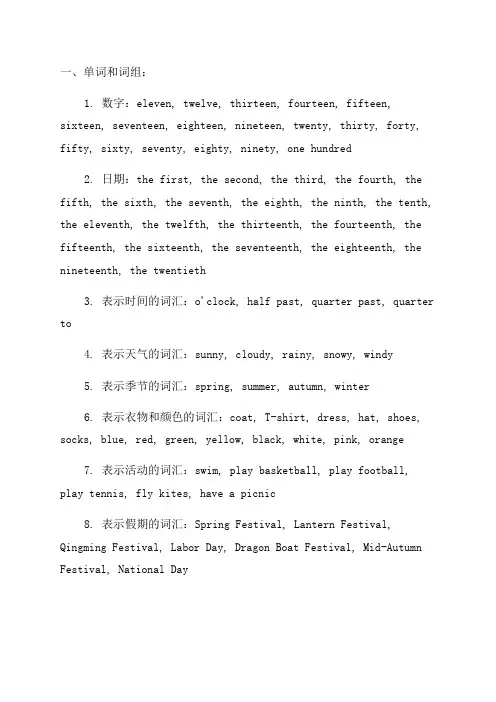
一、单词和词组:1. 数字:eleven, twelve, thirteen, fourteen, fifteen, sixteen, seventeen, eighteen, nineteen, twenty, thirty, forty, fifty, sixty, seventy, eighty, ninety, one hundred2. 日期:the first, the second, the third, the fourth, the fifth, the sixth, the seventh, the eighth, the ninth, the tenth, the eleventh, the twelfth, the thirteenth, the fourteenth, the fifteenth, the sixteenth, the seventeenth, the eighteenth, the nineteenth, the twentieth3. 表示时间的词汇:o'clock, half past, quarter past, quarter to4. 表示天气的词汇:sunny, cloudy, rainy, snowy, windy5. 表示季节的词汇:spring, summer, autumn, winter6. 表示衣物和颜色的词汇:coat, T-shirt, dress, hat, shoes, socks, blue, red, green, yellow, black, white, pink, orange7. 表示活动的词汇:swim, play basketball, play football, play tennis, fly kites, have a picnic8. 表示假期的词汇:Spring Festival, Lantern Festival, Qingming Festival, Labor Day, Dragon Boat Festival, Mid-Autumn Festival, National Day9. 形容词:big, small, tall, short, long, short, thin, fat, heavy, light, strong, weak, fast, slow, happy, sad, angry, hungry, thirsty, excited, scared, tired10. 情态动词:can, can't, could, couldn't, may, may not,will, won't, shall, shall not, must, must not二、基本句型和语法:1. 一般疑问句:Is it...? Are you...? Do you like...? Does he have...?2. 肯定回答:Yes, it is. Yes, I am. Yes, I do. Yes, he does.3. 否定回答:No, it isn't. No, I'm not. No, I don't. No, he doesn't.4.一般现在时的肯定句:主语+动词原形+其他5. 一般现在时的否定句:主语 + 动词原形 + not + 其他6. 一般现在时的一般疑问句:Do/Does + 主语 + 动词原形 + 其他?7. 一般现在时的特殊疑问句:Wh- + do/does + 主语 + 动词原形 + 其他?8. there is/there are 句型:There is + 单数名词 + 其他;There are + 复数名词 + 其他9. can/can't 句型:主语 + can/can't + 动词原形 + 其他10. could/couldn't 句型:主语 + could/couldn't + 动词原形 +其他11. can/could 提示:Can you...? Could you...? Yes, I can. Yes, I could.12. may/may not 句型:主语 + may/may not + 动词原形 + 其他13. will/won't 句型:主语 + will/won't + 动词原形 + 其他14. shall/shall not 句型:主语 + shall/shall not + 动词原形+ 其他15. must/must not 句型:主语 + must/must not + 动词原形 + 其他三、课文内容:1. Unit 1: How Do You Go There?(交通工具的使用方式)2. Unit 2: How Was Your Day Yesterday?(过去一天的活动)3. Unit 3: What's Your Hobby?(运动和爱好)4. Unit 4: What's the Day Today?(日期和天气)5. Unit 5: What Season Do You Like?(季节和天气)6. Unit 6: What Are You Wearing?(衣物和颜色)7. Unit 7: Can You Swim?(运动技能)8. Unit 8: What Did You Do in the Holidays?(假期活动)9. Unit 9: Whose Is It?(物品所有者)10. Unit 10: What Can You Do?(能力和兴趣)四、日常对话和口语表达:1. 问候:Hello! Hi! Good morning! Good afternoon! Good evening! Nice to meet you!2. 自我介绍:My name is... I am... years old. I am from...3. 询问他人的姓名和年龄:What's your name? How old are you?4. 询问他人的住所:Where do you live?5. 询问他人的过去活动:What did you do yesterday? Did you...?6. 询问他人的兴趣爱好:What's your hobby? Do you like...?7. 询问日期和天气:What's the day today? What's the weather like today?8. 询问季节和喜好:What season do you like?9. 询问衣物的颜色和穿着:What color is it? What are you wearing?10. 询问他人的能力:Can you...?以上就是外研版小学四年级英语下学期知识点的总结。
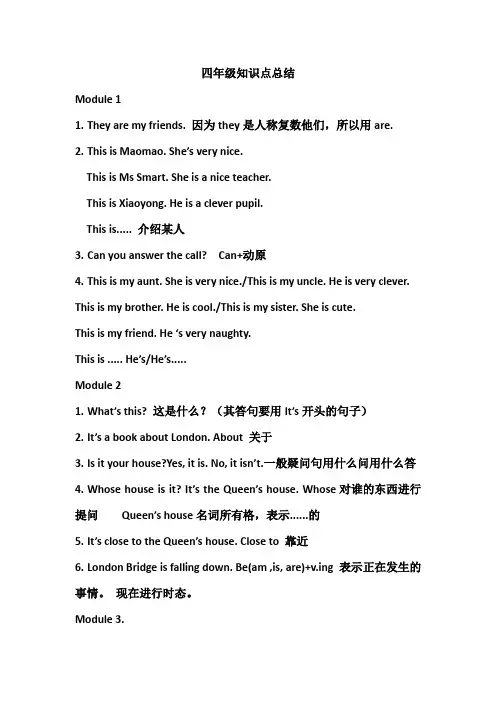
四年级知识点总结Module 11.They are my friends. 因为they是人称复数他们,所以用are.2.This is Maomao. She’s very nice.This is Ms Smart. She is a nice teacher.This is Xiaoyong. He is a clever pupil.This is..... 介绍某人3.Can you answer the call? Can+动原4.This is my aunt. She is very nice./This is my uncle. He is very clever. This is my brother. He is cool./This is my sister. She is cute.This is my friend. He ‘s very naughty.This is ..... He’s/He’s.....Module 21.What’s this? 这是什么?(其答句要用It’s开头的句子)2.It’s a book about London. About 关于3.Is it your house?Yes, it is. No, it isn’t.一般疑问句用什么问用什么答4.Whose house is it? It’s the Queen’s house. Whose对谁的东西进行提问Queen’s house名词所有格,表示......的5.It’s close to the Queen’s house. Close to 靠近6.London Bridge is falling down. Be(am ,is, are)+v.ing 表示正在发生的事情。
现在进行时态。
Module 3.1.Sam can ride a bike. Amy can fly a kite. Can+ 动原ride a bike译为骑自行车。

四年级英语下册知识点总结(外研社全册)四年级英语下册知识点总结四年级英语下册是外研社出版的一套教材,本教材囊括了四年级下学期的重要英语知识点。
本文将对这些知识点进行总结,以帮助学生加深对这些知识的理解和掌握。
一、单词学习1. 数字和时间:在四年级下册中,学生将学习如何表达数字和时间。
他们将学会用英语表达1到100的数字,以及学会问候并报时。
2. 家庭成员:学生将学习如何用英语表达家人的关系,比如爸爸、妈妈、姐姐、弟弟等。
3. 学校设施:学生将学习一些常见的学校设施的英文词汇,比如教室、图书馆、操场等。
4. 日常生活用品:学生将学会一些日常生活用品的英文名称,比如床、桌子、椅子等。
二、句型构造1. 询问与回答:学生将学会询问和回答简单的问题,比如“你叫什么名字?”“你几岁了?”等。
2. 表达喜好和能力:学生将学会用英语表示自己的喜好和能力,比如“I like swimming.”(我喜欢游泳)和“I can play the piano.”(我会弹钢琴)等。
3. 表达日常活动:学生将学会用英文表达一些日常活动,比如“我每天上学。
”(I go to school every day)和“我通常和朋友一起玩。
”(I usually play with my friends)等。
4. 情态动词的用法:学生将学习情态动词can和must的用法,例如can用于表示能力和许可,而must用于表示义务和必须。
三、语法知识1. 现在进行时:学生将学会现在进行时的构成和用法,例如“I am swimming.”(我正在游泳)和“She is eating dinner.”(她正在吃晚饭)等。
2. 一般过去时:学生将学习一般过去时的构成和用法,例如“I played soccer yesterday.”(我昨天踢足球)和“He watched a movie last night.”(他昨晚看电影)等。
3. 形容词的比较级和最高级:学生将学会形容词的比较级和最高级的构成和用法,例如“taller”(更高的)和“the tallest”(最高的)。
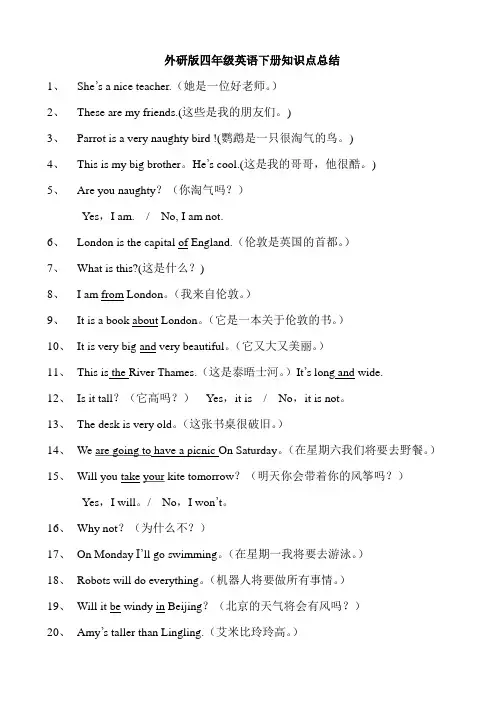
外研版四年级英语下册知识点总结1、She’s a nice teacher.(她是一位好老师。
)2、These are my friends.(这些是我的朋友们。
)3、Parrot is a very naughty bird !(鹦鹉是一只很淘气的鸟。
)4、This is my big brother。
He’s cool.(这是我的哥哥,他很酷。
)5、Are you naughty?(你淘气吗?)Yes,I am. / No, I am not.6、London is the capital of England.(伦敦是英国的首都。
)7、What is this?(这是什么?)8、I am from London。
(我来自伦敦。
)9、It is a book about London。
(它是一本关于伦敦的书。
)10、It is very big and very beautiful。
(它又大又美丽。
)11、This is the River Thames.(这是泰晤士河。
)It’s long and wide.12、Is it tall?(它高吗?)Yes,it is / No,it is not。
13、The desk is very old。
(这张书桌很破旧。
)14、We are going to have a picnic On Saturday。
(在星期六我们将要去野餐。
)15、Will you take your kite tomorrow?(明天你会带着你的风筝吗?)Yes,I will。
/ No,I won’t。
16、Why not?(为什么不?)17、On Monday I’ll go swimming。
(在星期一我将要去游泳。
)18、Robots will do everything。
(机器人将要做所有事情。
)19、Will it be windy in Beijing?(北京的天气将会有风吗?)20、Amy’s taller than Lingling.(艾米比玲玲高。
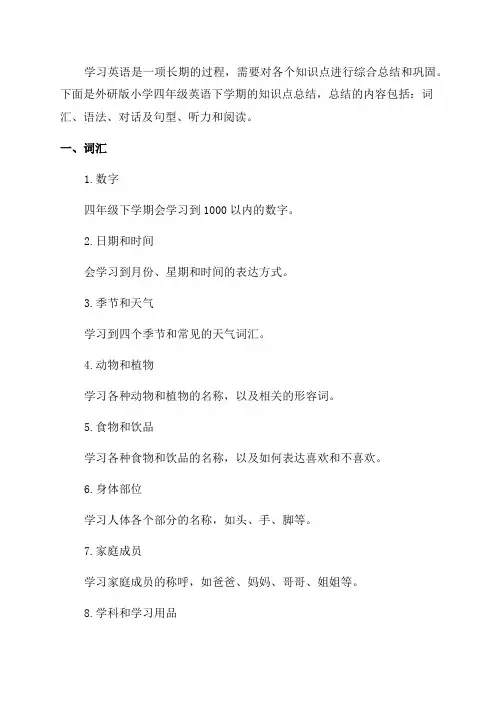
学习英语是一项长期的过程,需要对各个知识点进行综合总结和巩固。
下面是外研版小学四年级英语下学期的知识点总结,总结的内容包括:词汇、语法、对话及句型、听力和阅读。
一、词汇1.数字四年级下学期会学习到1000以内的数字。
2.日期和时间会学习到月份、星期和时间的表达方式。
3.季节和天气学习到四个季节和常见的天气词汇。
4.动物和植物学习各种动物和植物的名称,以及相关的形容词。
5.食物和饮品学习各种食物和饮品的名称,以及如何表达喜欢和不喜欢。
6.身体部位学习人体各个部分的名称,如头、手、脚等。
7.家庭成员学习家庭成员的称呼,如爸爸、妈妈、哥哥、姐姐等。
8.学科和学习用品学习各种学科和学习用品的名称。
二、语法1.数字的表达学习如何表达数字,包括基数词和序数词。
2.一般现在时学习一般现在时的基本用法,并学会构造肯定句、否定句和疑问句。
3.介词的使用学习几个常用的介词并能正确运用在句子中。
4.物主代词学习如何用物主代词表达物品的所有关系。
5.反意疑问句学习如何使用反意疑问句来加强陈述句的语气。
三、对话及句型1.问候和交流学习如何用英语进行问候和交流,如"Hello, how are you?"。
2.请求和询问学习如何用礼貌的方式请求和询问,如"Can I have a pen, please?"。
3.表达喜好和不喜好学习如何表达自己的喜好和不喜好,如"I like swimming, but Idon't like running"。
4.描述事物学习如何用英语描述事物的外表、颜色、大小等特点。
5.提供帮助和回答问题学习如何提供帮助和回答问题,如"Do you need any help?"。
四、听力1.听懂简单的对话通过听力练习,培养听懂简单对话的能力,如问候、介绍自己、询问个人信息等。
2.听懂简单的指示和指导词通过听力练习,培养听懂简单指示和指导词的能力,如Go straight、Turn left等。
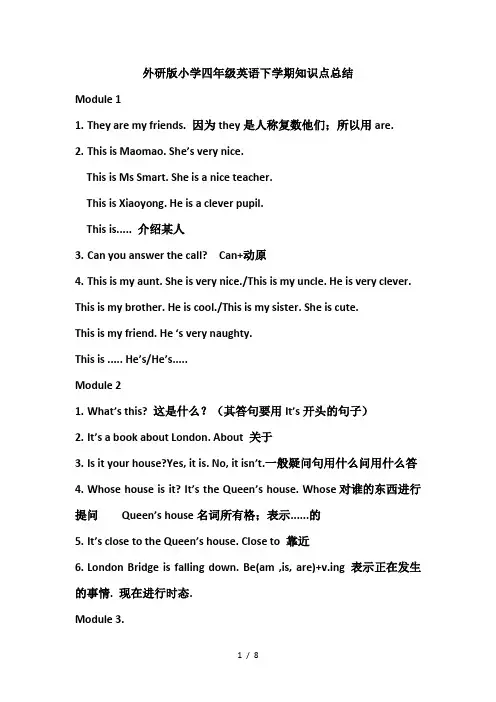
外研版小学四年级英语下学期知识点总结Module 11.They are my friends. 因为they是人称复数他们;所以用are.2.This is Maomao. She’s very nice.This is Ms Smart. She is a nice teacher.This is Xiaoyong. He is a clever pupil.This is..... 介绍某人3.Can you answer the call? Can+动原4.This is my aunt. She is very nice./This is my uncle. He is very clever. This is my brother. He is cool./This is my sister. She is cute.This is my friend. He ‘s very naughty.This is ..... He’s/He’s.....Module 21.What’s this? 这是什么?(其答句要用It’s开头的句子)2.It’s a book about London. About 关于3.Is it your house?Yes, it is. No, it isn’t.一般疑问句用什么问用什么答4.Whose house is it? It’s the Queen’s house. Whose对谁的东西进行提问Queen’s house名词所有格;表示......的5.It’s close to the Queen’s house. Close to 靠近6.London Bridge is falling down. Be(am ,is, are)+v.ing 表示正在发生的事情. 现在进行时态.Module 3.1.Sam can ride a bike. Amy can fly a kite. Can+ 动原ride a bike译为骑自行车. fly a kite 译为放风筝.2.What’s that,Daming? It’s a robot. What’s that? What’s this? 回答都用It’s a....3.One day, robots will do everything.they will do the housework. Will+动原they will help children learn.they will do our homework.4.Nex tweek is a holiday. What will you do,Shanshan?询问某人将要干什么?用什么时态问;就用什么时态答.On Monday, I’ll go swimming. On Tuesday, I ‘ll play with my friends.On Wednesday, i ‘ll go to the park.On Thursday, i ‘ll do my homework. On Friday, i’ll visit my grandpa. On Saturday, i’ll help my mother. On Sunday, i’ll read my books.On+星期几/will+动原.5.Today is Monday and tomorrow is Tuesday.Module41.On Saturday we’re going to have a picnic. On +星期be going to+动原;have a picnic举行野餐2.Will you take your kite tomorrow? Yes, i will . No, i won’t.一般疑问句;用什么问用什么答.3.Why not? Because tomorrow is Friday. 用why 问用because答4.I will take my kite and my ball on Saturday. Will +动原. on+星期5.It will be sunny in Beijing.will be+形容词6.Will it be hot in Haikou? Yes, it will. No, it won’t.一般疑问句;用什么问用什么答.Module 51.be( am, is(was) ) I he she it 单三(was)Are ----were you they we 复数(were)2.I am ten now, but i was two then. (now 表示现在时态;用am;then 表示过去时态用was)3.She wasn’t fat.She was thin.4.They weren’t old then.They were young.5.Was it fat? No, it wasn’t. It was thin.(一般疑问句;肯否定回答用Yes/No)Module 6be动词的口诀:我(I)用am ;你(you)用are ,is 连着他(he)她(she)它(it),单数(is)复数(are)变疑问be提前;句末问号莫忘记;变否定更容易;be 加not 要牢记;疑问否定任意变;句首大写莫忘记.(Be动词过去很容易;am,is 变was.然后把are变成were)1.Were you at the park yesterday? Yes,i was. No, i wasn’t.2.Is it sunny in London? Yes, it is. No, it isn’t.3.Was it sunny in London? Yes, it was. No, it wasn’t.一般疑问句;肯否回答很重要;用什么问用什么答4.I want to play in the sun. Want to do sth 想要做某事.在太阳下用介词“in”.5.Were you at home yesterday? Yes, i was. No , i wasn’t.(同1-3题)6.I was out with Grandpa for our Chinese lesson.我和爷爷出去上我们的汉语课了.7.Was it a big city then? Yes,it was. No, it wasn’t.(同1-3题)8.Where is he? He is in Shenzhen. Where 对地方提问in+大地方9.The park was small then. It is big now. 遇到then 用过去式遇到now 用现在进行时.Module 7动词过去式变化规则:一般情况下加-ed;哑e结尾直加d, 辅y 为i 加ed, 重读闭音节;单辅字母要双写;再加ed.练习题:is /am---( ) row----( ) have---( )Phone---( ) cook---( ) help---( ) wash--( )Do---( ) play---( ) watch---( ) talk---( )Walk--( ) listen---( )1.Yesterday was a holiday. It was a beautiful day. 遇到yesterday 动词用过去式.2.We rowed a boat on the lake. Row--rowed on the lake在湖面上3.We all had a very happy day. Have--had4.On Monday Amy phoned Grandma. On +星期phone--phoned5.I cooked noddles yesterday. Cook--cooked yesterday 过去式标志词6.I helped Mum and i washed clothes. Help--helped wash--washed7.He didn’t help Mum. Didn’t加动原8.9.I love him. 喜欢某人;him;人称代词用宾格.10.I talked with Miss Dog yesterday. Talk--talked talk with和...交谈11.I walked with Miss Cat yesterday.walk--walked walk with 和... 一起散步.12.They listened to music. Listen--listened listen to music听音乐13.Grandma cooked fish and cooked noddles. Cook--cooked14.What did they do last night? Do--did last night 昨晚过去式标志词Module 81.We had picnic last Sunday. Have--had last +时间(year month Monday--Sunday)用过去式2.Was it fun? Yes, it was. No, it wasn’t.一般疑问句;用什么问用什么答.3.We went there by bus. Go--went By+交通工具.4.And we saw some birds. They song beautifully. See--saw sing--song5.We ate some food and drank some drinks. Eat--ate drink--drank6.He was thin then .H e is very fat now. Then 用于过去式;故用was;now 用于现在时;故用is.7.Tell me about your picnic. About 关于8.We ate lots of delicious food. Eat--ate lots of=a lot of许多加可数名词复数9.I took some pictures and i made a poster. Take--took make--madest Sunday Dad went swimming. Mum went to the supermarket.Grandma listened to music. I did my homework. Last +时间表示过去式go--went listen--listened do--didModule91.It’s a postcard from my cousin Dalong. He lives in the US. From 来自He 是单三;所以lives2.Does he live in New York.?因为he 是单三;所以用does;live in +地方表示居住在某地3.Did he live in New York last year? Yes, he did. No, he didn’t.一般疑问句肯否定回答.4.I am on holiday in New York. On holiday 度假. in +大地方5.Did you travel by plane. By+交通工具6.I went to a pop concert and a basketball game last week. 因为last week 译为上周;故go 用went.7.Did you have a nice holiday?8.Did you go to Hangzhou?9.Did you visited the famous West lake?10.Did you see your friends lili in Hongkang?在疑问句和否定句中;后面的动词用原型.Moudle 101.What happened to your head? What happened to...? 怎么了;发生什么事了?2.Sam and I went for a bike ride yesterday. went for a bike ride 骑自行车3.Did you buy some water? No, we bought a watermelon. 在疑问句中后面动词用原型. buy--bought4.Sam carried the watermelon on the bike. Carry--carried on the bike 在自行车上5.Did you fall off your bike? No, Sam fell off his bike. fall off 译为跌落. fall--fell6.He took me and the watermelon to the hospital. Take--took take...to...把某人/某物带到某地7.Sam had lots of chocolate yesterday, so today he has got a stomach ache.8.Daming had two watermelons yesterday, so today he has got a stomach ache.9.Amy had a cold yesterday, and she’s got a headache.10.Lingling had a headache yesterday, and today she’s got a fever.He/she’s got =he/she has got 译为患....11.We played games all the day. all the day译为一整天.卓越教育培训学校。
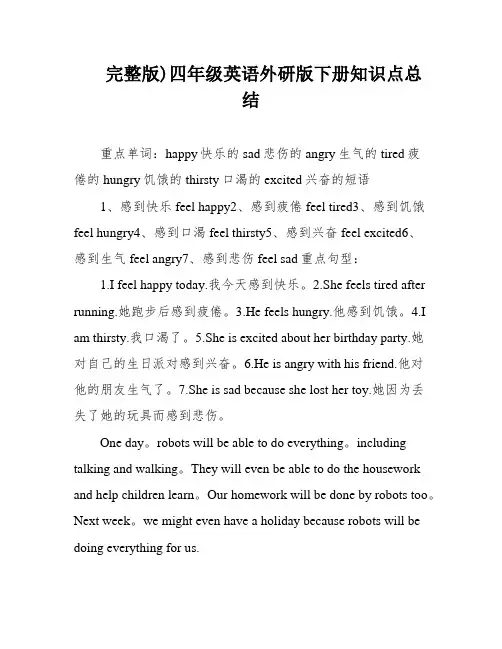
完整版)四年级英语外研版下册知识点总结重点单词:happy快乐的sad悲伤的angry生气的tired疲倦的hungry饥饿的thirsty口渴的excited兴奋的短语1、感到快乐feel happy2、感到疲倦feel tired3、感到饥饿feel hungry4、感到口渴feel thirsty5、感到兴奋feel excited6、感到生气feel angry7、感到悲伤feel sad重点句型:1.I feel happy today.我今天感到快乐。
2.She feels tired after running.她跑步后感到疲倦。
3.He feels hungry.他感到饥饿。
4.I am thirsty.我口渴了。
5.She is excited about her birthday party.她对自己的生日派对感到兴奋。
6.He is angry with his friend.他对他的朋友生气了。
7.She is sad because she lost her toy.她因为丢失了她的玩具而感到悲伤。
One day。
robots will be able to do everything。
including talking and walking。
They will even be able to do the housework and help children learn。
Our homework will be done by robots too。
Next week。
we might even have a holiday because robots will be doing everything for us.On Saturday。
the weather will be great for a ic。
Will you take your kite or ball。
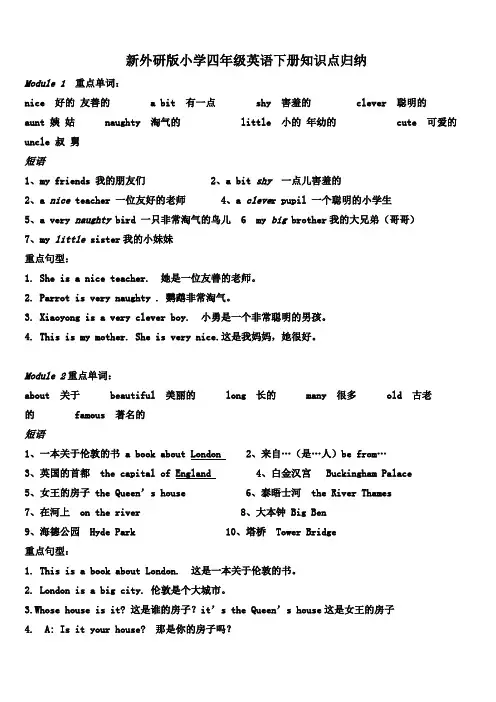
新外研版小学四年级英语下册知识点归纳Module 1 重点单词:nice 好的友善的 a bit 有一点 shy 害羞的clever 聪明的aunt 姨姑 naughty 淘气的 little 小的年幼的 cute 可爱的uncle 叔舅短语1、my friends 我的朋友们2、a bit shy 一点儿害羞的2、a nice teacher 一位友好的老师 4、a cleve r pupil 一个聪明的小学生5、a very naughty bird 一只非常淘气的鸟儿 6 my big brother我的大兄弟(哥哥)7、my little sister我的小妹妹重点句型:1. She is a nice teacher. 她是一位友善的老师。
2. Parrot is very naughty . 鹦鹉非常淘气。
3. Xiaoyong is a very clever boy. 小勇是一个非常聪明的男孩。
4. This is my mother. She is very nice.这是我妈妈,她很好。
Module 2重点单词:about 关于beautiful 美丽的long 长的many 很多old 古老的famous 著名的短语1、一本关于伦敦的书 a book about London2、来自…(是…人)be from…3、英国的首都 the capital of England4、白金汉宫 Buckingham Palace5、女王的房子 the Queen’s house6、泰晤士河 the River Thames7、在河上 on the river 8、大本钟 Big Ben9、海德公园 Hyde Park 10、塔桥 Tower Bridge重点句型:1. This is a book about London. 这是一本关于伦敦的书。
2. London is a big city. 伦敦是个大城市。
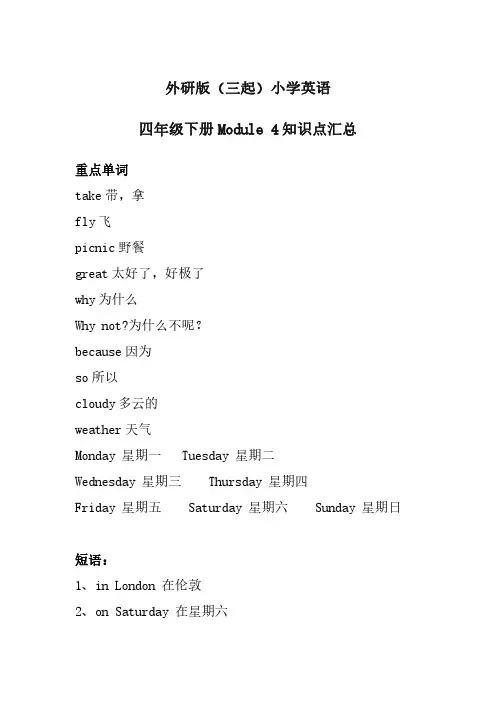
外研版(三起)小学英语四年级下册Module4知识点汇总重点单词take带,拿fly飞picnic野餐great太好了,好极了why为什么Why not?为什么不呢?because因为so所以cloudy多云的weather天气Monday星期一Tuesday星期二Wednesday星期三Thursday星期四Friday星期五Saturday星期六Sunday星期日短语:1、in London在伦敦2、on Saturday在星期六3、have a picnic举行、进行野餐4、take your kite/ball带上你的风筝/球5、The Weather Tomorrow明天的天气(情况)6、be windy刮风的7、be hot炎热的8、be cold寒冷的9、be sunny晴朗的10、rain下雨11、snow下雪12、why not为什么不呢重点句型:1.A:Will you take your kite tomorrow?明天你带着你的风筝吗?B:Yes,I will.\No,I won’t.是的,我会。
\不,我不会。
2.On Saturday we’re going to have a picnic.星期六我们要去野餐。
3.A:Why not?为什么不呢?B:Because tomorrow is Friday.因为明天是周五。
4.A:What will Shanshan do on Monday?姗姗星期一要干什么?B:On Monday she’ll play with her friend.周一她会和朋友们玩。
5.A:Will it be windy in Beijing?北京会有风吗?B:Yes,it will.是的,会.\No,it won’t.不,不会。
6.What will the weather be today?今天的天气将会怎样?。
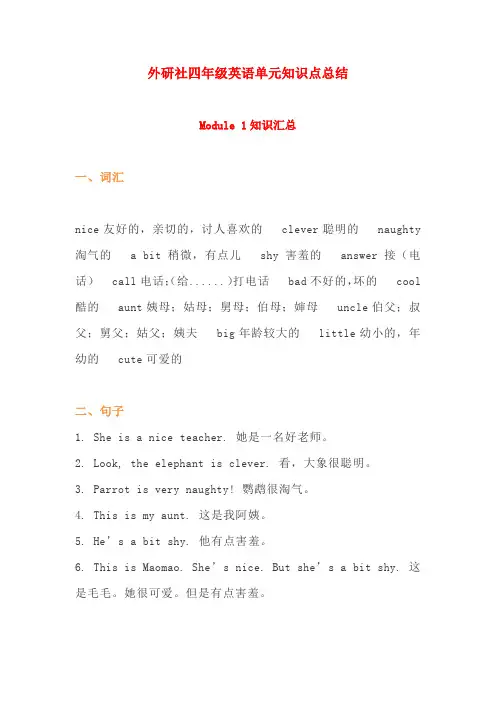
外研社四年级英语单元知识点总结Module 1知识汇总一、词汇nice友好的,亲切的,讨人喜欢的clever聪明的naughty 淘气的 a bit稍微,有点儿shy害羞的answer接(电话)call电话;(给......)打电话bad不好的,坏的cool 酷的aunt姨母;姑母;舅母;伯母;婶母uncle伯父;叔父;舅父;姑父;姨夫big年龄较大的little幼小的,年幼的cute可爱的二、句子1. She is a nice teacher. 她是一名好老师。
2. Look, the elephant is clever. 看,大象很聪明。
3. Parrot is very naughty! 鹦鹉很淘气。
4. This is my aunt. 这是我阿姨。
5. He’s a bit shy. 他有点害羞。
6. This is Maomao. She’s nice. But she’s a bit shy. 这是毛毛。
她很可爱。
但是有点害羞。
三、句型结构介绍某人(是谁、性格特点)This is ... He / She is + 描写人物性格特点的形容词.eg: This is my uncle. He is tall and clever. 这是我叔叔。
他很高很聪明。
This is my teacher. She is thin and nice. 这是我的老师。
她很瘦很漂亮。
四、单词辨析little 和smalllittle 表示“小的”,带有感情色彩small主要指的是“尺寸”、“重量”等,本身不带任何感情色彩eg: I have a little sister. 我有一个小妹妹。
(含有“喜欢”的意思)The box is too small. 盒子太小了。
(单纯指的是盒子的大小)Module 2知识汇总一、词汇city城市ship船beautiful美丽的whose谁的queen 女王close近的,接近的old年代久的,古老的famous 著名的景点名称:Buckingham Palace白金汉宫Big Ben大本钟Hyde Park海德公园Tower Bridge塔桥London Bridge伦敦大桥二、句子1. — What’s this? 这是什么?— It’s a book about London. 是关于伦敦的一本书。
外研社小学四年级英语下册知识点第一模块一;重点单词:nice 好的;友善的 a bit 有一点 shy 害羞的 clever 聪明的naughty 淘气的 cool 酷的 little 小的;年幼的 cute 可爱的二;重点句型:1; She is a nice teacher;她是一位友善的老师。
2; Parrot is a very naughty bird; Parrot是一只非常淘气的鸟儿。
3; Xiaoyong is a very nice boy;小勇是一个非常好的男孩。
4; This is my mother; She is very nice;这是我妈妈;她很好。
5; These are my friends;这些是我的朋友。
《注意复数形式》6; A: Are you naughty? 你淘气吗?B: Yes, I am;/No, I’m not;是的;我是。
/不;我不。
《注意情景连线》第二模块一;重点单词:capital 首都 about 关于 beautiful 美丽的 long 长的 wide 宽的many 很多 river 河流 old 古老的 famous 著名的二;重点短语:look at 看;看一看 the Buckingham Palace 白金汉宫 the Big Ben大本钟 the River Thames 泰晤士河 the Hyde Park 海德公园 the Tower Bridge 塔桥三;重点句型:1; London is the capital of England;伦敦是英国的首都。
2; This is a book about London;这是一本关于伦敦的书。
3; This is the River Thames;这是泰晤士河。
4; There are many boats on the river;河上有许多船。
5;A: What’s this? 这是什么?B: It’s a book about London;这是一本关于伦敦的书。
外研版小学英语(一起)四年级下册期末复习知识汇总外研一起四年级下册Module 1知识汇总一、词汇machine 机器welcome 欢迎crisp炸薯片sir先生potato马铃薯,土豆dangerous危险的put放,安放,放置wait等;等待each各自,每个二、句子These machines make crisps.这些机器做薯条。
1.— What does this machine do, sir?这个机器是做什么的,先生?—It washes the potatoes.它是洗土豆的。
2.Don't touch the machines, please!请不要触摸这些机器!3.They are dangerous.它们很危险。
4.You can each have a bag of crisps.你们每人可以得到一包薯条。
5.Don't feed the baby.不要给那个婴儿喂食。
6.Play with the baby!和婴儿一起玩。
7.Don't write on the books.不要在书上写字。
8.Don't walk on the grass!不要踩草坪。
9.Be quiet, please!请安静!三、句型结构.DoMt+动词原形+其他.用于提醒某人不要做某事。
eg: Don't make noise in class.不能在课堂上喧闹。
1.动词原形+其他.祈使句,表示让(请)某人做某事。
eg: Hold on, please.请稍等。
Be careful!小心!外研一起四年级下册Module 2知识汇总一、词汇cheap便宜的expensive昂贵的send发送;寄email电子邮件cost花费;价钱为hundred 一百二、句子1.I've got a new hat.我有一顶新帽子。
2.— What colour is it?它是什么颜色的?—It's pink.它是粉色的。
外研版四年级英语下册总结Module1--10短语Module 1 短语1、my friends 我的朋友们2、a bit 一点儿3、a nice teacher 一位友善的老师4、a clever pupil 一个聪明的小学生5、a very naughty bird 一只非常淘气的鸟儿6、my big brother我的大兄弟哥哥7、my little sister我的小妹妹Module 2 短语1、a book about London 一本伦敦的书2、be from…来自…是…人3、the capital of England 英国的首都4、Buckingham Palace白金汉宫5、the Queen’s house皇后女王的房子6、the River Thames泰晤士河7、on the river在河上8、Big Ben大本钟9、Hyde Park 哈德公园10. Tower Bridge塔桥11. London Beidge伦敦桥12 fall down倒下Module 3 短语:2、on Saturday 在星期六3、have a picnic 举行、进行野餐5、take your kite 带上你的风筝6、go swimming 去游泳7、next week 下周8、a holiday 一个假期9、play with my friends和我的朋友玩10、go to the park 去公园11、do myone`s homework 做我的某人的作业12、visit my grandma 拜访我的奶奶13、help my mother 帮助我妈妈做家务14、read my books 看我的书Module4 短语1、one day 有一天/总有一天2、do the housework 做家务3、help children learn帮助孩子们学习4、do our homework 做我们的作业5、make cakes 做蛋糕6、listen to music 听音乐7、in Beijing 在北京8、The Weather Tomorrow 明天的天气情况9、be windy 刮风的10、be hot 炎热的11、I don`t know .我不知道.12、be cloudy 阴天/多云的Module5短语:1、stand up 起立2、the Changjiang River 长江3、the Yellow River 黄河4、Mount Qomolangma 珠穆朗玛峰5、Mount Tai 泰山6、the Great Wall 长城7、the Summer Palace 颐和园Module6 短语:1、the first girl 第一个女孩2、Be quiet ,please请安静3、that little boy那个小男孩4、the winner 冠军/胜利者5、Chinese music中国音乐6、play the erhu拉二胡7、play the zither 弹古筝8、pop music 流行音乐9、play the guitar弹吉他10、play the drums打架子鼓11、what music 什么音乐Module7. 短语:1、New York纽约2、in the east在东部3、be called 被称作…4、the USA美国5、speak English说/讲英语6、in America在美国7、That`s right.不错/那是正确的.8、Washington . 华盛顿10、San Francisco旧金山11、a nice city一座好城市12、in the west在西部13、in the north在北部14、a famous city一座着名的城市15、in the south在南部/方Module 8 短语:1、that little girl那个小女孩2、so short如此矮3、so cute如此可爱Module 9 短语:1.help Mumhelp sb.帮助妈妈2..phone grandmaphone sb.给奶奶打电话4.cook fish做鱼5.listen to music听音乐in the park在公园里散步to some friends和一些朋友聊天nice day一个好天on the computer玩电脑about.....什么怎么样lunch做午饭noodles for lunch 午饭做面条weekend上周末Module 10 短语:1.what happened to.........怎么了for a bike ride去骑自行车then....那后来呢hungry饿了thirsty渴了a watermelon买西瓜buy sth.买某东西 the bike在自行车off his bike从自行车上摔下来my head碰了我的头10.lots of许多biscuits巧克力饼干got /have a stomachache肚子/胃疼 a cold感冒a headache头疼a fever发烧a horrible cold重感冒cold感觉冷hot感觉热one`s head抓/挠头Module 1.句子1、These are my friends.这些是我的朋友.2、This is Maomao.这是毛毛.3、She is a bit shy.她有点害羞.4、She is a nice teacher.她是一位友善的老师.5、He`s cool.他很酷.6、She has a little curl.她有一小绺鬈发.7、Are you naughty Yes,I am./No,I am not.你淘气吗是的,我淘气./不,我不淘气.Module 2.句子1、What`s this 这是什么 It`s a dog .2、It`s a book about London . 它是一本伦敦的书.3、London is the capital of England .伦敦是英国的首都.4、I`m from London .我来自伦敦.5、It`s very big and very beautiful .它非常大非常美丽.6、But It`s very beautiful ,too .但它也很美丽.7、This is the River Thames .这是泰晤士河.8、It`s long and wide .它又长又宽.9、There are many boats on the river .河上有许多船.10、It`s very famous .它非常着名.11、Is it tall Yes,it is.它是高的吗是的,它是.一般疑问句把“is”提前.12、London Bridge is falling down .伦敦桥倒了.Module 3.句子1、On Saterday we`re going to have a picnic .星期六我们准备去野餐.2、Will you take your kite tomorrowYes,I will/No,I won`t.明天你将带风筝去吗是的,我将带.不,我不会的.will的一般疑问句及肯、否定回答3、Why not Because tomorrow is Friday.为什么不呢因为明天是星期五.4、So I will take my kite and my ball on Saterday.因此星期六我将带风筝和球.5、Next week is a holiday.下周是假期.6、What will you do ,ShanshanOn Monday I`ll go simming .珊珊,你打算做什么星期一我去游泳.7、What will Shanshan do on Monday星期一珊珊将要干什么will的特殊疑问句8、Today is Monday and tomorrow is Tuesday.今天是星期一,明天是星期二.9、Will you play football on MondayYes,I will/No,I won`t.星期一你将踢足球吗是的,我会./不,我不会.will可以应用于各种人称,其形式不变.Module 4.句子1、What`s that It`s a robot .那是什么它那是一个机器人.2、It can walk 它会走再如This bird can talk .这只鸟儿会说话.3、One day robots will do everything .总有一天,机器人会做所有的事情.4、And they will help children learn .并且他们能帮助孩子们学习.5、Will they do our homework No,they won`t .他们将会做家庭作业吗不,他们不会.6、Will it be windy in Beijing Yes ,it will ./No. it won`t.北京将会使刮风天吗是的,它会./不,它不会.注意表示天气变化的词:windy刮风的/有风的;rainy下雨的/多雨的;snowy下雪的/多雪的;sunny晴朗的/阳光充足的;cloudy多云的/阴天;hot炎热的;cold寒冷的;warm暖和的;cool凉爽的/凉快的.7、What will the weather be today 今天的天气怎样8、Will it be sunny tomorrow Yes ,it will ./No ,it wom`t .明天天气晴朗吗是的,它将是./不,它不是.Module 5.句子1、Amy`s taller than Lingling .艾米比玲玲高.2、Is Sam stronger than Lingling Yes ,he is ./No ,he isn`t .萨姆比玲玲强壮吗是的,他是./不,他不是.再如:Are you taller than me Yes ,I am .你比我高吗是的,我是.3、The Changjiang River is longer than the Yellow River ,长江比黄河长.4、Mount Qomolangma is higher than Mount Tai .珠穆朗玛峰比泰山高.5、The Great Wall is older than the Summer Palace 长城比颐和园历史悠久.6、北京比天津大.Beijing is bigger than Tianjin .Module 6.句子1、This girl is good/bad .这个女孩是好的/差的.再如:This book is good .That book is bad .这本书好,那本书不好.2、I like her voice .我喜欢她的声音.“我不喜欢她的声音”怎么说I don`t like her voice3、I think this girl is better than the first girl .我认为这个女孩比第一个女孩更好.再如:I think she`s worse .我认为她更差.4、Do you agree ,Sam No ,I don`t .萨姆,你同意吗不,我不同意.5、Who is that little boy It`s Tom . He`s our brother . 那个小男孩是谁是汤姆.他是我们的兄弟.6、Daming and Lingling like Chinese music .大明和玲玲喜欢中国音乐.再如:I like pop music .我喜欢流行音乐.7、They can play the erhu .他们会拉二胡.8、What music do you like Ilike pop music .I think pop music ia better .你喜欢什么音乐我喜欢流行音乐.我认为流行音乐较好.Module 7.句子1、New York is in the east.纽约在东部.Washington . is in the east.华盛顿在东部.2、This is my project.这是我的综合实践活动.It`s about America.它是美国的.4、It`s also called the USA.它也被称作美利坚合众国.He is called Lao Wang.他被叫做老王.5、People speak English in America.在美国人们说英语/美国人说英语.People speak English in England.在英国人们讲英语.6、Washington . is the capital of the USA.华盛顿是美国的首都.伦敦是英国的首都London is the capital of England,;北京是中国的首都.Beijing is the capital of China.7、My cousin,Dalong ,lives there.我的堂兄,大龙,I live in Beijing .我住在北京.Sam lives in New lives there,too.萨姆住在纽约.艾米也住在那儿.8、Where is New YorkIt`s in the east.纽约在哪儿它在东部.上海在哪儿它在东部.Where is Shanghai It`s in the east. Where is New York 9、Sanya is a famous city in China.三亚是中国着名的城市.9、San Francisco is a famous city in America.旧金山是美国着名的城市.练习:西安是中国着名的城市.Xian is a famous city in China.10、I want to visit Emgland and go to London ,too.我要去英国旅游,也要去伦敦.11、I want to go swimming .我要去游泳.Module 8.句子1、 Who are they,LinglingThey are my grandparents. 玲玲.他们是谁他们是我的祖父母.2、Who is that little boyIt`s Tom.那个小男孩是谁是汤姆.They are my were young,then.他们是我的祖父母.他们那时是年轻的.2、They are old.他们是年老的.练习:她那时是胖的,她现在是瘦的.She was fat,`s thin now.3、I was two,then.我那时两岁了.练习:I was three, am 11 now.我那时三岁了,我现在11岁了.4、But your hair was so short.但是那时你的头发是如此的短.再如:You were so cute.你如此可爱.练习:她那时也非常淘气.Then she was very naughty,too.5、She was she`s thin.她那时胖,她现在瘦了.练习:他那时矮,他现在高.He was short,he is tall now. .他们那时年轻,现在他们上年纪了年老了.They were young,they are old now.6、They weren`t old then .They were young.练习:她那时不高,她是很矮.She wasn`t tall was short. .他那时不淘气.他是可爱的.He wasn`t naughty was cute它那是不胖.它是瘦的. It wasn`t fat was thin.7、Was it fat No,it wasn` was thin.它胖吗不,它不胖.它是瘦的.练习:他们年轻吗不,不是的.他们年老了.Were they youngNo,they weren`他淘气吗不,不是的.他是可爱的.hey were old. Was he naughty No,he wasn` was cute.Module 9.句子1.On Monday Amy phoned Grandma.星期一,艾米给奶奶打电话了.2.再如:Yesterday Grandma cooked fish.昨天奶奶做鱼了.我们在公园里散步并和一些朋友聊天.We walked in the park and we talked to some friends.2.Did you cook meat yesterdayNo,Ididn`t.昨天你做肉了吗不,没有.再如:Did you listen to musicNo,we didn`t.你们听音乐了吗不,我们没有.你和萨姆帮助你妈妈吗是的,我们帮助了.Did you and Sam help your motherYes,we did.3.Was it a nice day天气是个好天吗再如:Was it Monday yesterday昨天是星期一吗练习:昨天天气晴朗吗是的,晴朗..Was it sunny yesterdayYes,it was.4.Did it rain hereNo,it didn` rained here.这儿下雨了.5.I helped Sam didn`t played on the computer.我帮助妈妈了.但是萨姆没有帮助.它在玩电脑.再如:Dad watched TV,he didn`t help Mum.爸爸看电视,他没有帮助妈妈.6.What about Tom汤姆怎么样呢再如:Yesterday I watched about you昨天我看电视的,你呢7.Yesterday Mr Smart cooked noodles for lunch.昨天斯玛特先生午饭做面条了.再如:I cooked fish for lunch.我午饭做鱼了.8.Did Dad cook lunchYes,he did./No,he didn`t.爸爸做午饭了吗是的,他做了./不,他没做.练习:你上周末打篮球了吗不,我没有.Did you play basketball last weekendNo,I didn`t.萨姆帮助妈妈了吗不,他没有.Did Sam help MumNo,he didn`t.9.We walked and walked .We talked and talked.我们走呀走.我们说呀说.练习:我们笑呀笑.我们玩呀玩.We laughed and played and played.Module 10.句子1.What happened to your head,Daming大明,你的头怎么了再如:What happened to your bike你的自行车怎么了2.Sam and I went for a bike ride yesterday.昨天我和萨姆去骑自行车了.如:Sam likes riding a bike.萨姆喜欢骑自行车.3.And then....然后呢这是说发生事情有时间先后联系的句子常用的连接词,then在这儿讲“后来”4.And then we were hungry and thirsty.然后我们又饥又渴.再如:I am hungry,he is thirsty.我饿了,他渴了.5.So we bought a watermelon.所以我们就买了个西瓜.so在描述一个事件时,用来连接因果关系的句子.再如:I got up at 9:oo this morning,so I was late for my class.今天早上我九点钟才起床,所以我迟到了.6.Sam carried the watermelon on the bike.萨姆在自行车带着西瓜.7.Then Sam fell off his bike.萨姆从他的自行车上摔下来了.再如:He fell off the desk.他从桌子上掉下来了.8.And the watermelon bumped my head西瓜砸/碰了我的头.再如:The apple bumped my face.那个苹果砸了我的脸.9.Sam had lots of chocolate biscuits yesterday,so today he`s got a stomachache.昨天萨姆吃了许多巧克力饼干,所以今天他胃疼.再如:Daming had two watermelons yesterday,so today he`s got a stomachache.大明昨天吃了两个西瓜,所以今天他肚子疼.10.Amy had a cold yesterday,and today she`s got a headache.艾米昨天感冒了,所以今天她头疼.再如:Little Tommy had a horrible cold,His nose was red and he felt cold,cold,cold.小汤姆得了重感冒,他的鼻子红了,他感觉冷呀冷.1、反义词:old老的——young年轻的old旧的——new新的long长的——short短的big大的——small小的east东——west西south南——north北good好的——bad差的better更好的——worse更差的tall高的——short矮的then那时——now现在fat胖的——thin瘦的little小的——big大的here这里——there那里hot热的——cold冷的2、对应词east东——west西south南——north北why为什么——because因为then那时——now现在this这个——that那个3、过去式:go去——wentdo做——didbuy买——bought fall跌落——fellread读——readget获得——gothave/has有——hadam/is是——wasare是——wereeat吃——atedance跳舞——danced watch观看——watched carry携带——carried bump碰——bumpedplay玩——playedhelp帮助——helpedrain雨——rainedwalk走路——walkedtalk说话——talked4、原级/比较级:good好的——better更好的bad差的——worse更差的big大的——bigger更大的thin瘦的——thinner更瘦的fat胖的——fatter更胖的hot热的——hotter更热的 old老的——older更老的 long长的——longer更长的tall高的——taller更高的young年轻的——younger更年轻的short短的——shorter更短的high高的——higher更高的。
外研社小学四年级下册知识总结第一模块一、短语1、my friends 我的朋友们2、a bit 一点儿3、a nice teacher 一位友善的老师4、a clever pupil 一个聪明的小学生5、a very naughty bird 一直非常淘气的鸟儿6、my big brother我的大兄弟(哥哥)7、my little sister我的小妹妹8、look at 看…..9、Panpan`s little sister 盼盼的小妹妹 10、a little sister 一个小女孩 11、a little curl一小绺鬈发12、a very clever girl 一个非常聪明的女孩 13、a very nice boy一个非常友善的男孩二、句型1、These are my friends.这些是我的朋友。
【These +are+名词复数形式;This+is+名词单数形式】请翻译:这些是猴子。
这是一只猴子。
2、This is Maomao.这是毛毛。
【向别人介绍某人,用“This is+某人”句型。
】请向我介绍:这是我的小弟弟。
3、She is a bit shy.她有点害羞。
【She is+形容词,“她是…”形容词表示主语的特征、性格等;a bit 一点儿,very和a bit是表示程度的副词,常放在形容词前,分别表示“非常”和“有一点”。
】练习:他非常酷,但他有点高。
4、She is a nice teacher.她是一位友善的老师。
【某人+is+a/an+形容词+名词单数】5、He`s cool.他(很)酷。
【cool 可表示天气,是“凉爽”;表示人,是“酷”的意思。
】6、She has a little curl.她有一小绺鬈发。
【a little修饰不可数名词,表示“一点儿”。
】7、Are you naughty ?Yes,I am./No,I am not.你淘气吗?是的,我淘气。
Module4一、单词Take 带、拿fly 飞picnic野餐great 太好了why为什么Why not 为什么不because 因为so 所以cloudy 云的weather天气二、短语On Saturday在星期六have a picnic野餐三、核心句型1、on Saturday we’re going to have a picnic. 描述某人打算做某事的句子在星期六我们打算去野餐。
句型结构:主语+am/is/are going to do(动词原形)+其他通常与表示将来的时间状语连用。
如:tomorrow next year,next month,时间状语可以放在句首,也可放在句末。
否定句型为:主语+am/is/are not going to do(动词原形)+其他2、will you take your kite tomorrow? 明天你将要带着你的风筝吗?No,I won’t.不,我不带。
这是询问对方是否将要做某事的问句及答语。
问句:will you +动词原形+其他肯定回答:Yes,I/we will否定回答:No,I/ we will not.3、Why not?为什么不呢?Why not 是一个省略的特殊疑问句,结合上下文的语境,在口语中可以把与上文重复的信息省略掉,只保留why not?Why not 的其他用法,可以询问原因,可以表示赞同或赞成,表示建议或命令。
4、because 和so的用法because为连词,因为的意思。
用来说明原因,常用来回答why引导的特殊疑问句。
So为连词,表示所以的意思。
用来说明结果。
5、It will be sunny in Beijing. 北京将会是晴天。
It will be+表示天气状况的形容词+in+地点。
6、will it be+表示天气状况的形容词+in+地点?肯定回答:Yes,it will.否定回答:No.it will not.7、What will the weather be today? =What will the weather be like today?=How will the weather be today? 询问天气怎么样,三个句子表达的含义是一样的。
千里之行,始于足下。
外研版四年级英语下册知识点总结外研版四年级英语下册知识点总结四年级英语下册是外研版小学英语教材的一册,主要包含了词汇、语法、听力和口语等方面的知识点。
下面是对这些知识点的总结。
词汇部分:该部分主要包括四年级学生需要掌握的核心词汇和表达方式,如数字、颜色、家庭成员、食物、动物等。
学生应掌握这些词汇的发音和基本用法,并能够应用到日常会话中。
语法部分:该部分主要包括四年级学生需要掌握的基本句型和语法规则,如一般现在时、一般过去时、疑问句等。
学生应掌握这些句型和规则的构造和用法,并能够通过这些句型和规则进行简单的语言表达。
听力部分:该部分主要训练学生的听力能力,培养学生对英语语音、语调和意义的理解能力。
学生应通过听录音材料,理解并答题,提高自己的听力水平。
口语部分:该部分主要通过对话、朗读和问答等方式,培养学生的口语表达能力,提高学生的语音、语调和表达的准确性。
学生应掌握一些简单句型和常用表达方式,能够进行简单的日常会话。
文化知识部分:第1页/共2页锲而不舍,金石可镂。
该部分主要介绍英语国家的文化和习俗,帮助学生了解英国和美国的风土人情。
学生可以通过这些内容了解不同国家的文化差异,丰富自己的眼界。
综合应用部分:该部分主要通过练习题和活动,帮助学生巩固所学知识,并应用到实际生活中。
学生应能够通过这些练习,独立运用所学知识进行简单的文段写作、听力理解和口语表达等。
总之,外研版四年级英语下册的知识点主要包括词汇、语法、听力和口语等方面的内容。
学生在学习这些知识点时,应多听多说,善于应用,提高自己的语言能力。
同时,学生还应有针对性地进行练习,巩固所学知识,使之不仅停留在理解层面,而能够熟练应用于实际生活中。
四年级知识点总结Module 11.They are my friends. 因为they是人称复数他们,所以用are.2.This is Maomao. She’s very nice.This is Ms Smart. She is a nice teacher.This is Xiaoyong. He is a clever pupil.This is..... 介绍某人3.Can you answer the call? Can+动原4.This is my aunt. She is very nice./This is my uncle. He is very clever.This is my brother. He is cool./This is my sister. She is cute. This is my friend. He ‘s very naughty.This is ..... He’s/He’s.....Module 21.What’s this? 这是什么?(其答句要用It’s开头的句子)2.It’s a book about London. About 关于3.Is it your house?Yes, it is. No, it isn’t.一般疑问句用什么问用什么答4.Whose house is it? It’s the Queen’s house. Whose对谁的东西进行提问 Queen’s house名词所有格,表示......的5.It’s close to the Queen’s house. Close to 靠近6.London Bridge is falling down. Be(am ,is, are)+ 表示正在发生的事情。
现在进行时态。
Module 3.1.Sam can ride a bike. Amy can fly a kite. Can+ 动原 ridea bike译为骑自行车。
fly a kite 译为放风筝。
2.What’s that,Daming? It’s a robot. What’s that? What’s this? 回答都用It’s a....3.One day, robots will do everything.they will do the housework. Will+动原they will help children learn.they will do our homework.4.Nex tweek is a holiday. What will you do,Shanshan?询问某人将要干什么?用什么时态问,就用什么时态答。
On Monday, I’ll go swimming. On Tuesday, I ‘ll play with myWednesday, i ‘ll go to the park.On Thursday, i ‘ll do my homework. On Friday, i’ll visit my grandpa. On Saturday, i’ll help my mother. On Sunday, i’ll read my books.On+星期几/will+动原。
5.Today is Monday and tomorrow is Tuesday.Module41.On Saturday we’re going to have a picnic. On +星期 be going to+动原, have a picnic举行野餐2.Will you take your kite tomorrow? Yes, i will . No, i won’t.一般疑问句,用什么问用什么答。
3.Why not? Because tomorrow is Friday. 用why 问用because 答4.I will take my kite and my ball on Saturday. Will +动原。
on+星期5.It will be sunny in be+形容词6.Will it be hot in Haikou? Yes, it will. No, it won’t.一般疑问句,用什么问用什么答。
Module 51.be( am, is(was) ) I he she it 单三(was)Are ----were you they we 复数(were)2.I am ten now, but i was two then. (now 表示现在时态,用am,then 表示过去时态用was)3.She wasn’t was thin。
4.They weren’t old were young.5.Was it fat? No, it wasn’t. It was thin.(一般疑问句,肯否定回答用Yes/No)Module 6be动词的口诀:我(I)用am ,你( you)用are ,is 连着他(he)她(she)它(it),单数(is)复数(are)变疑问be提前,句末问号莫忘记,变否定更容易,be 加not 要牢记,疑问否定任意变,句首大写莫忘记。
(Be动词过去很容易,am,is 变was.然后把are变成were)1.Were you at the park yesterday? Yes,i was. No, i wasn’t.2.Is it sunny in London? Yes, it is. No, it isn’t.3.Was it sunny in London? Yes, it was. No, it wasn’t.一般疑问句,肯否回答很重要,用什么问用什么答4.I want to play in the sun. Want to do sth 想要做某事。
在太阳下用介词“in”。
5.Were you at home yesterday? Yes, i was. No , i wasn’t.(同1-3题)6.I was out with Grandpa for our Chinese lesson.我和爷爷出去上我们的汉语课了。
7.Was it a big city then? Yes,it was. No, it wasn’t.(同1-3题)8.Where is he? He is in Shenzhen. Where 对地方提问 in+大地方9.The park was small then. It is big now. 遇到then 用过去式遇到now 用现在进行时。
Module 7动词过去式变化规则:一般情况下加-ed,哑e结尾直加d, 辅y 为i 加ed, 重读闭音节,单辅字母要双写,再加ed。
练习题:is /am---( ) row----( ) have---( ) Phone---( ) cook---( ) help---( ) wash--( ) Do---( ) play---( ) watch---( ) talk---( ) Walk--( ) listen---( )1.Yesterday was a holiday. It was a beautiful day. 遇到yesterday 动词用过去式。
2.We rowed a boat on the lake. Row--rowed on the lake在湖面上3.We all had a very happy day. Have--had4.On Monday Amy phoned Grandma. On +星期 phone--phoned5.I cooked noddles yesterday. Cook--cooked yesterday 过去式标志词6.I helped Mum and i washed clothes. Help--helped wash--washed7.He didn’t help Mum. Didn’t加动原8.He played on the computer and he watched TV. Play--played wash-washed9.I love him. 喜欢某人,him,人称代词用宾格。
10.I talked with Miss Dog yesterday. Talk--talked talk with 和...交谈11.I walked with Miss Cat walk with 和... 一起散步。
12.They listened to music. Listen--listened listen to music 听音乐13.Grandma cooked fish and cooked noddles. Cook--cooked14.What did they do last night? Do--did last night 昨晚过去式标志词Module 81.We had picnic last Sunday. Have--had last +时间(year month Monday--Sunday)用过去式2.Was it fun? Yes, it was. No, it wasn’t.一般疑问句,用什么问用什么答。
3.We went there by bus. Go--went By+交通工具。
4.And we saw some birds. They song beautifully. See--saw sing--song5.We ate some food and drank some drinks. Eat--ate drink--drank6.He was thin then .H e is very fat now. Then 用于过去式,故用was, now 用于现在时,故用is。
7.Tell me about your picnic. About 关于8.We ate lots of delicious food. Eat--ate lots of=a lot of 许多加可数名词复数9.I took some pictures and i made a poster. Take--tookmake--madest Sunday Dad went swimming. Mum went to the listened to music. I did my homework. Last +时间表示过去式 go--went listen--listened do--didModule9’s a postcard from my cousin Dalong. He lives in the US. From 来自He 是单三,所以lives2.Does he live in New York.?因为he 是单三,所以用does, live in +地方表示居住在某地3.Did he live in New York last year? Yes, he did. No, he didn’t.一般疑问句肯否定回答。